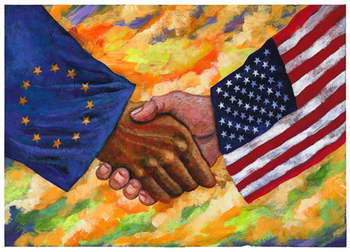
“Tonight, I am announcing that we will launch talks on a comprehensive Transatlantic Trade and Investment Partnership with the European Union, because trade that is free and fair across the Atlantic supports millions of good-paying American jobs,” declared President Obama in his State of the Union address in Washington, D.C.
A free trade agreement between the European Union and the United States has been discussed for several years. The idea has regained momentum since the end of 2011, in part due to the failures of international negotiations under the World Trade Organization.
Until now, development of an agreement has relied on a task force. It has yet to be formally launched at the political level with discussions that go to the heart of the matter.
“Even as we protect our people, we should remember that today’s world presents not only dangers, but opportunities,” emphasized the president.
Recently, German Chancellor Angela Merkel called for speeding up the process, noting some “positive signals” for the agreement in the U.S.
“We will have a much greater influence if we are together,” declared João Vale de Almeida, the current EU ambassador to the U.S.
In his speech, Obama did not expand on the economic details of the agreement, which include the fact that more than 800 million consumers from the two economic giants have traded $645.9 billion in total, according to U.S. statistics.
Complex Negotiations in Washington and Brussels
Tariffs between the two parties are currently quite low. However, there are protected sectors, such as clothing and shipping, especially on the American side, where trade barriers are still relatively high.
On the European side, trade liberalization needs to include a discussion on agriculture and the issue of genetically modified organisms, which are common in the United States but banned in the EU.
Vale de Almeida remarked, “These negotiations will not be easy. For these negotiations to succeed, we need, above all, political will.”
The negotiations will be politically complex, both in Brussels, where the Commission will lead the deal, and in Washington, where the American president has to deal with the Republican majority in the House of Representatives.
“There is now a consensus that the (union) will boost the economies of both sides of the Atlantic,” said Andràs Simonyi , the managing director at the Center for Transatlantic Relations.
By establishing a privileged partnership, these two heavyweights of the global economy also seek to circumvent the Doha Development Round, launched by the World Trade Organization in 2001, which has been heavily criticized.
“It would revive negotiations on trade liberalization,” suggested a European diplomatic source, who hopes that this partnership could encourage developing countries to liberalize, which they were not ready to do under the impasse in the World Trade Organization.
Obama also expressed in his speech his desire to finish negotiations begun in 2004 involving a different area of free trade: the Trans-Pacific Strategic Economic Partnership Agreement, which notably includes the U.S., Australia, Chile and Peru.

Leave a Reply
You must be logged in to post a comment.